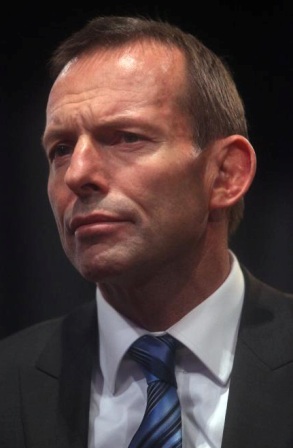tony abbott pushes parental leave for ‘women of calibre’
Opposition leader Tony Abbott was on the receiving end of backlash and mockery online after comments surrounding his proposed parental leave regulations. At a press conference on 7 May, Abbott told reporters the regulations were necessary if educated women were going to pursue careers.
‘If we want women of that calibre to have families, and we should, well, we have to give them a fair dinkum chance to do so. That is what this scheme of paid parental leave is all about.’
Abbott’s classification of educated women as ‘women of calibre’ is being called classist and sexist, and men and women responded online with the hashtag #Womenofcalibre.
He defended his comments (somewhat) a few days later, saying, ‘If it’s right for the bloke on holiday to get paid at his real wage, if it is right for the bloke on sick leave to get to paid his real wage, why isn’t it right for the woman on parental leave to get paid her real wage?’
It’s hard to argue the relationship between parental leave and women’s empowerment. A recent report from Save the Children measured the best and worst places in the world for mothers. Scandinavian countries topped the list. Turns out the best places in the world for mums are also some of the most committed to gender equality. Among the top ten best places to be a mother (and child), six ranked in the top ten in the Gender Inequality Index, which is based on reproductive health, empowerment, and labour participation.
Australia, at number ten on the Save the Children report, outranks Britain, Canada and the United States. Still, the proposal to give new mothers up to six months paid leave (at a cap of $75,000) is facing stiff opposition in Parliament. On 8 May, The Australian reported the plan could cost $2 billion more than expected by the Coalition and those costs are expected to rise by 2017.
Abbott is standing by the proposal in the face of harsh criticism from Prime Minister Julia Gillard that the scheme would provide assistance to those least in need of it.
‘The more you have, the more you get, and that isn’t how we provide assistance in Australia,’ she said.
While Abbott deserves kudos for the impassioned support for the rights of women, maternal rights (including the right to parental leave) aren’t just for the educated masses.
Neither is marriage or the chance at a career.
‘We do not educate women to higher degree level to deny them a career,’ Abbott said.
The focus on well-educated professional women ignores middle to low-income women in the workforce who face the similar barriers when they are the primary caregivers. Not only do they have fewer options and support from employers, but they are also less likely to have or be able to afford outside help and so must give up their already much lower wages to take care of children. To suggest that they are of a lower calibre and therefore warrant less, if any, mention or consideration in federal parental leave plans is troubling but sadly not surprising. Even the greatest supporters of women’s rights and gender equality tend to forget that poor women have always worked – and typically not in a “professional” capacity.
The argument that the work-life balance is keeping women from advancing in their careers fails to address blatant sexism in the workplace, not least of all the assumption that all women are on the “mummy-track” and would choose to be home after giving birth.
In January, Australia’s Department of Human Services introduced Dad and Partner Pay, which gives fathers up to two weeks off with government pay, provided they meet the requirements for leave. This is a start, but considering the standard for women is 18 weeks and Abbott’s proposal would give up to 24 weeks, parental leave regulations promote the expectation that women are responsible for infants.
Abbott is right to point out the futility of educating women only to restrict their choices once they enter the workforce. But those choices – including the choice to not give up six months of employment to stay home – must be extended to all women, regardless of their level of education or career aspirations.



Pingback: Feminist News Round-up 13.05.13 | News | Lip Magazine
“The focus on well-educated professional women ignores middle to low-income women in the workforce who face the similar barriers when they are the primary caregivers.”
This is true, but isn’t it also true that the under-representation of women in the upper echelons of society is part of the reason why gender equality is perpetuated so strongly?
Isn’t it in the public interest to ensure that gender equality in the cultural and economic elites is realised, as that will translate to greater equality for the middle and lower income streams?
Furthermore, making it a levy on business seems to reflect a growing understanding that a corporation cannot separate paid work from other parts of life and punish those who want to have a family. I don’t like Tony Abbott, but it’s certainly a better policy than Labor’s.